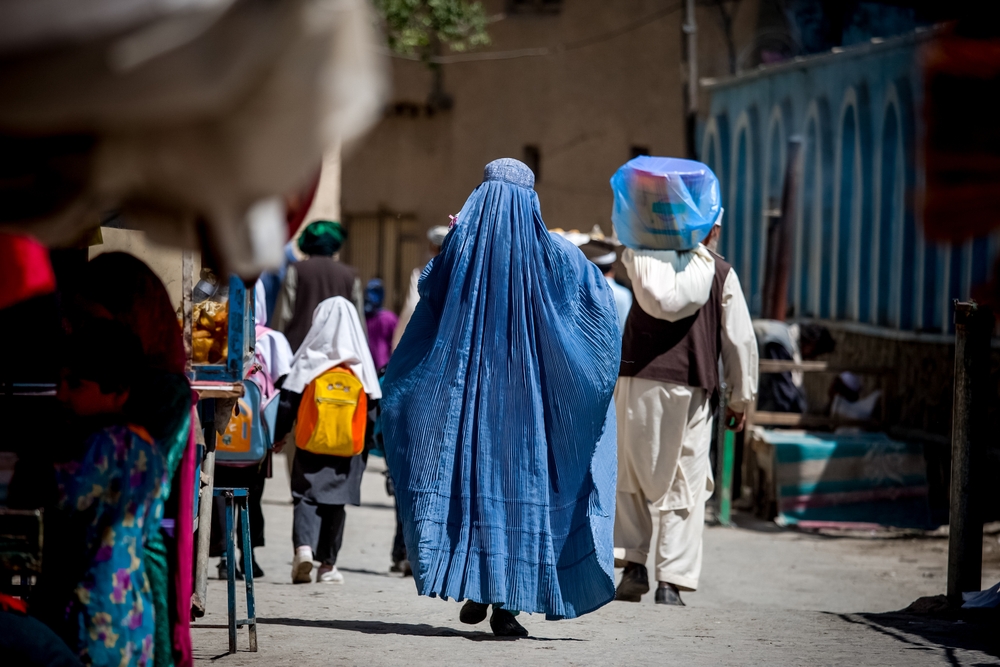Violations of Health Rights Under Taliban Rule:
Impacts on Afghan Women’s Physical and Mental Health
Manizha AshnaSince seizing control of Afghanistan in August 2021, the Taliban have implemented regressive policies that severely restrict the rights and freedoms of Afghan women and girls.
The Taliban’s prohibition of girls attending school beyond the sixth grade has deprived thousands of teens and pre-teens of access to education. This restriction perpetuates gender disparities in literacy and education and simultaneously undermines women’s opportunities for socio-economic advancement and empowerment. Women are barred from certain professions and face discrimination and harassment if they attempt to work. With limited opportunities for employment and economic autonomy, women are relegated to subordinate roles within the household, depriving them of financial independence. Additionally, the Taliban’s enforcement of strict dress codes and segregation policies severely restricts women’s freedom of movement which reinforces social isolation and hinders their ability to access healthcare.
Physical Health Impacts of Taliban Restrictions on Afghan Women and Girls
The Taliban’s restrictions on Afghan women’s mobility create significant barriers to their physical and mental well-being. Women are prohibited from travelling more than 45 miles without a male relative to escort them. This is particularly concerning given that nearly 10% of Afghanistan’s population has to travel more than two hours to reach a medical facility. Additionally, several news outlets have reported instances where Taliban officials prevented women from accessing medical facilities unless accompanied by their male guardian, also known as a mahram. These restrictions create significant barriers to women’s access to medical care, especially when they lack a male guardian available or willing to accompany them.
Cultural norms also dictate that a woman must obtain permission from her husband or a male relative to receive treatment from a male healthcare provider. This requirement further restricts women’s autonomy over their own bodies and their own healthcare decisions, potentially delaying or obstructing access to essential healthcare services. This lack of timely access to medical care can have serious consequences, as early detection, prompt intervention, and treatment are crucial for improving prognoses and reducing the risk of long-term complications or disability.
Child Marriage and Complications of Pregnancy
The deepening humanitarian crisis in Afghanistan following the Taliban takeover has exacerbated the longstanding issue of child marriage, leading to an increase in child selling and marriages. The high maternal mortality rate in Afghanistan is getting worse due to the increase in teenage pregnancies. Young girls face higher risks of complications like obstructed labor, fistula, and postpartum hemorrhage because their bodies are not fully developed, and they often lack access to proper healthcare. Babies born to adolescent mothers are at a higher risk prematurity, low birth weight, and neonatal complications. These infants also face higher mortality rates compared to those born to older mothers. The cycle of poverty, poor health, and limited education often persists with children born to child brides, perpetuating a cycle of disadvantage across generations.
Sexual- and Gender-Based Violence
The resurgence of Taliban rule has sparked an alarming surge in sexual and gender-based violence (SGBV) against women in Afghanistan. This violence encompasses a range of egregious acts, including murder, honor killings, sexual assault, forced marriage, physical injury, disability, and the denial of women’s rights to inheritances. Survivors of SGBV may endure a spectrum of physical injuries, ranging from bruises and lacerations to fractures and internal trauma. In severe cases, survivors may require medical treatment, surgical intervention, and rehabilitative care. The stigma surrounding SGBV, coupled with the absence of support services, exacerbate the challenges confronted by survivors. Under Taliban rule, Afghan women encounter severe limitations or an outright absence of access to social services, including shelters and support networks tailored for survivors of gender-based violence. This dire circumstance renders them susceptible to further abuse and exploitation.
Mental Health Impacts
Witnessing acts of violence, experiencing displacement, losing loved ones, and living in constant fear for their safety have resulted in high levels of psychological trauma, anxiety, and distress among Afghan women. The oppressive environment under Taliban rule further amplifies women’s mental health issues, leading to heightened levels of anxiety, depression, and trauma. Afghanistan faces significant challenges in delivering mental health services, including a shortage of trained mental health professionals, inadequate infrastructure, and cultural barriers to seeking help. Restrictions on education and employment opportunities further limit Afghan women’s ability to cope with stressors and access support networks, thereby exacerbating their mental health challenges.
The Taliban’s Breach of Health Rights and International Agreements
Health is a fundamental human right and includes the right to timely, acceptable, and affordable healthcare of appropriate quality, including reproductive and maternal health services. The Taliban has violated numerous international and national laws and policies related to the health and rights of women and girls in Afghanistan. Their actions raise concerns about potential violations of the principles outlined in the World Health Organization (WHO) Constitution. Adopted in 1946, the WHO Constitution recognizes the highest attainable standard of health as a fundamental right for every human being, without discrimination based on race, religion, political belief, or economic or social condition. It emphasizes special protection for mothers and children to ensure their right to health. However, Taliban policies restricting women’s rights to education, employment, and healthcare undermine efforts to improve maternal and child health outcomes in Afghanistan.
The Taliban’s actions in Afghanistan have led to numerous violations of the Convention on the Elimination of All Forms of Discrimination Against Women (CEDAW). Afghanistan is a signatory to CEDAW, having ratified the Convention on March 5, 2003. As a party to CEDAW, Afghanistan is legally bound to uphold the principles of gender equality and eliminate discrimination against women in all forms, including education, employment, healthcare, and public life. Article 12 of the Convention emphasizes ensuring equal access to healthcare services, including those related to family planning. Article 16 addresses equality in marriage and family relations, impacting reproductive health and rights.
The Taliban’s governance in Afghanistan has failed to establish crucial regulatory frameworks necessary for advancing Sustainable Development Goals (SDGs), particularly SDG 3 (Good Health and Well-being), SDG 4 (Quality Education), and SDG 5 (Gender Equality). Their inability to enforce policies ensuring equitable access to healthcare services, especially for women and girls, exacerbates health disparities and obstructs progress toward SDG 3. The Taliban’s policies have severely impeded progress toward SDG 4 by imposing restrictions on girls’ education; many girls are banned from secondary and higher education, significantly reducing educational opportunities for half the population. Furthermore, the absence of legislation promoting gender equality, combined with restrictive measures that limit women’s access to education, employment opportunities, and participation in public life, undermines efforts to achieve SDG 5. This failure to implement comprehensive regulations addressing these critical areas impedes Afghanistan’s development trajectory and violates international commitments to sustainable development and human rights.
Call to Action: Raise Awareness and End Harmful Policies
The Taliban’s restrictions on women’s rights in Afghanistan have significant, long-term impacts on both physical and mental health. Education for Afghan women and girls plays a critical role in mitigating some of these adverse effects by equipping them with the knowledge and skills necessary to maintain their health and the health of their families. Access to education enhances women’s understanding of health information, promotes adherence to medical advice, and encourages preventive health behaviors. Furthermore, educated women are better positioned to advocate for their health rights and access necessary health services, which can improve health outcomes for themselves and their families.







All comments will be reviewed and posted if substantive and of general interest to IAPHS readers.